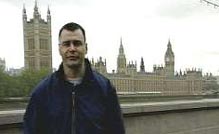
Jon Pike read Politics, Philosophy and Economics at Trinity College, Oxford then studied for his doctorate at the University of Glasgow, where he went on to teach. He’s currently with the Open University Philosophy Department. A specialist in political philosophy, here he gives Ever Wondered? political theorist Niccolo Machiavelli’s tips to climbing the greasy pole to power.
"Politics is about power and we all know that power corrupts. So should politicians have a different moral code to the rest of us? Certainly, according to the book The Prince by Niccolo Machiavelli.
Machiavelli was a 16th century diplomat who lost his job in the Renaissance equivalent of a coup d’état. Keen to impress the new rulers, he wrote them this little advice manual, an A-Z of how to wield political power. Today, being Machiavellian implies being unprincipled and manipulative. So just how relevant is his advice to today’s powerful politicians?
Jon: Machiavelli’s first tip - if you have to choose, it’s better to be feared than loved…
Gerald Kauffman MP: I have always taken the view that it’s easy to be loved, but being feared gets things done. Take Mr. Blair. He looks like a very friendly person and is a very voter friendly person but my gosh his party fears him.
Jon : …So fear has its political uses. But what about any moral qualms a politician might have. Tip 2, the end justifies the means. You may have to be cruel to be kind.
Martin Bell MP: All the colleagues of different parties will from time to time have to support things they don’t really believe in. I’m in the fortunate position of not having to do that, but I can see that those kind of compromises are necessary. I would call them necessary evils.
 Jon: So it’s the consequences of your actions that matter, not the rightness or wrongness of the act itself. Being in charge means that you can’t always act with good faith, charity, kindness.
Jon: So it’s the consequences of your actions that matter, not the rightness or wrongness of the act itself. Being in charge means that you can’t always act with good faith, charity, kindness.
Lembit Opik MP : In politics you’ve got to make tough choices that you don’t necessarily face in your everyday life. For example, if you send an army to war you are consigning people to their deaths. That’s the kind of difficult choice that I think Machiavelli was referring to, and yes, sometimes you have to make choices which are way outside ordinary experience.
Jon: But if you’re worried about your conscience, don’t be. Machiavelli has it covered. Tip 3 is that different standards of morality apply to the world of politics.
Jane Griffiths MP: Politics is about power, and nobody should forget that it’s about power and your personal relationships shouldn’t be.
Charles Kennedy MP: Occasionally in public life there is a need to lie, and I think we’ve got to be honest with people about that. I actually think people understand that. For example, the Chancellor has to lie - professionally - over the exchange rate, because you can’t say ’Well, in two weeks time I intend to devalue’. You just can’t do it, you’ve got to lie.
Jon: So lie professionally, trample on peoples rights if that’s what’s necessary. That’s Machiavelli’s advice.
What he says is dangerous, and true.
It’s true because we do want those who hold power to be driven by the common good. We don’t want them to be squeamish about getting their hands dirty. But it’s also dangerous. Machiavelli provides a manifesto for the virtuous politician, but also for the self-serving Charlatan. That’s the paradox of The Prince.
If you would like to learn more about Machiavelli and other political philosophers then have a look at course AA311 Reading Political Philosophy: Machiavelli to Mill
If you would like to learn more about the history of the 19th Century then have a look at course A221 State, Economy and Nation in the Nineteenth-Century Europe
If you would like to find out more about these subjects, here are a few suggestions.
Books you can read
The Prince,Niccolo Machiavelli, Peter Bondanella (Translator),
Oxford Paperbacks; ISBN: 0192833979
Classics of Modern Political Theory : Machiavelli to Mill,Steven M. Cahn (Editor)
Oxford University Press; ISBN: 0195101731
Twentieth-century British Political Facts, 1900-2000,David Butler, Gareth Butler
Macmillan Press Ltd; ISBN: 0333772229
Links You Can Surf
Information on Niccolo Machiavelli and his work
Information on the House of Commons
http://www.politicalresources.net/uk.htm
Political resources on the net in the United Kingdom and Northern Ireland
Also on this site: join Kriss Akabusi as he asks is there any limit to physical power and Anita Roddick asks just how powerful is people power ?
If you think you might be interested in studying more about these subjects, find out what the Open University has to offer.
The BBC and the Open University are not responsible for the content of external websites
Rate and Review
Rate this article
Review this article
Log into OpenLearn to leave reviews and join in the conversation.
Article reviews